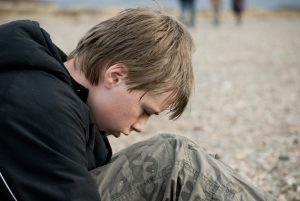The Abuse of Overparenting
 I recently watched my 11-year-old nephew play basketball in his local league. As I took in the scene of the freshly polished court, the paid referees, illuminated scoreboard, and live buzzers, I couldn’t help but think how grown up my nephew and his team had become. There they were independently taking coach instructions, chatting with the refs, and playing with skill and technique. That is until something out-of-sync occurred. One of the kids was accidentally elbowed, as several kids had been throughout the game. Seemingly hurt, the boy paused the game and covered his face with his hands, perhaps in tears, perhaps not. All at once, a frantic mother rapidly emerged from the bleachers rushing the court, armed with sweaters and Gatorade. She turned reassuringly to the crowd of stunned parents and in a grand gesture, swept her son into her arms. At this, the young boy shook away in surprise. He immediately pulled himself together, and his face quickly went from grimacing in pain to flushing in humiliation.
I recently watched my 11-year-old nephew play basketball in his local league. As I took in the scene of the freshly polished court, the paid referees, illuminated scoreboard, and live buzzers, I couldn’t help but think how grown up my nephew and his team had become. There they were independently taking coach instructions, chatting with the refs, and playing with skill and technique. That is until something out-of-sync occurred. One of the kids was accidentally elbowed, as several kids had been throughout the game. Seemingly hurt, the boy paused the game and covered his face with his hands, perhaps in tears, perhaps not. All at once, a frantic mother rapidly emerged from the bleachers rushing the court, armed with sweaters and Gatorade. She turned reassuringly to the crowd of stunned parents and in a grand gesture, swept her son into her arms. At this, the young boy shook away in surprise. He immediately pulled himself together, and his face quickly went from grimacing in pain to flushing in humiliation.
As parents, we all have that innate desire to protect and provide for our kids. Yet, at some point we must ask ourselves, are we doing too much for them? When do our actions cross the line from offering security and support to embarrassing them in front of their entire basketball team? The mis-attunement in this particular mother’s actions was clear in everything from her lack of pause to the odd choice of items she brought to soothe her son, whose minor injury doubtfully rendered him either thirsty or cold. However, we are all guilty of mild and extreme acts of over-protectiveness and over-parenting that can be very damaging to a developing child.
When we assume our children need more than they do, we are undermining their abilities and hurting their confidence. I first noticed this when I took my 4-year-old daughter to a dance class. When we got there, she happily changed into her outfit and removed her shoes, then asked me to put her hair in a ponytail before she trotted off to class. Moments later a classmate of hers arrived in a stroller, hugging a blanket, and sucking a pacifier. Her father helped her out of her seat, removed her shoes, assured her that her very own personal bag of snacks would be there if she got hungry, and she trotted off to class. That day, my daughter stumbled through the new steps taught in her class, while the other girl spun through the class with the grace and skill of a pro. When she returned to her father, she cried and complained for her pacifier and her snacks.
The scene reminded me that, as parents, we often fail to recognize how capable our children are. Little acts like pushing them in a stroller instead of letting them walk or giving them a snack before they even feel hunger teaches them to believe they need more looking after than they actually do. Society’s recent pro-parenting shift has its positives. Children are people, and they deserve to have a voice within their home. Parents should always aim to treat their kids with respect, interest, and consideration. However, the trend of helicopter parenting has been taken to extremes and, in that, we are also witnessing pro-parenting’s negative effects.
A 2011 PEW Research survey further found that “40% of 18- to 24-year-olds currently live with their parents, and the vast majority of them say they did not move back home because of economic conditions.” Young adults who move out then back in with their parents, whether for financial reasons or not, have led people to refer to them as the Boomerang Generation. Though reasons for this are in part economical and societal, I personally believe there is value in investigating how the raising of our children might play some part in their lack of independence in adulthood.
Many parents are willing to overextend themselves in catering to their children and excessively meeting their needs. They then feel surprised or resentful when their children grow up feeling unable to care for themselves. Doing too much for our kids teaches them to be dependent. Growing up, by its very nature, is a series of weaning experiences for children. From the moment a child is born, they are weaned from the comfort and safety of their mother’s womb. Learning the lessons of how to get their needs met then transitioning to meeting their own needs is not only essential to a person’s survival but to their psychological well-being.
Similarly, many parents tend to offer kids praise as a means of boosting their confidence. While acknowledging our children’s positive traits is healthy and beneficial to their development, offering them empty praise can be just the opposite. A study showed that kids who were rewarded or complimented for menial or unfitting attributes saw no benefit from the praise. Conversely, acclaim offered to kids for real characteristics did have a positive effect on their self-esteem.
Unsubstantiated appraisals only leave kids feeling the pressure that they need to be great all the time to live up to the buildup instead of feeling like they are okay just being who they actually are. We can help our children get a real feeling for themselves by offering them real love and affection, while equipping them with skills that help them feel competent.
A helpful way to look at this is to imagine taking your kids to the park. How much do you let them explore and play independently from you? How much do you interfere and direct their behavior? Are you overly cautious about their safety? Do you discourage them from venturing out on their own? Are you over-attentive to their fears or encouraging of their resilience?
The park example provides a good metaphor for how we raise our children. A parent should be a secure base from which a child can explore the world. At the park, we can let them be independent while always letting them know that we are there to help, support, and guide them in their own unique adventure. We can be standing by when they need us, and we can step aside when they do not. In doing so, we should allow our children to experience the world for themselves.
Often, the reasons it is difficult for us to let our kids explore and develop their autonomy has more to do with us than with our children. As parents, it is invaluable to be aware of when we are using our children to fulfill our own needs. How much does our desire to protect them come from them? And how much does it come from our own need to act a protector? How often are the hugs we give them to provide affection, and how often are they to take affection from them?
So much of parenting involves how we feel about ourselves. As psychologist and author Pat Love has said, the best thing adults can do as parents is to have their needs met by other adults and not by their children. Our kids need us to be the best, most developed, and most fulfilled versions of ourselves in all areas of our lives in order to feel independent and secure in theirs. That way, they can emulate and learn from us without feeling they must fill the voids we experience in our own lives.
When we give our kids too much power, we start to act like victims to our children instead of the teachers, caregivers, and role models we should be. Overindulging, over-rewarding, or babying our children actually serves as a sort of pressure for greatness and a set up for disappointment. The empty acts we mistake for nurturance are at best substitutes for real love and at worst forms of actual abuse. It’s no great coincidence that many of the children we see being spoiled or indulged also appear unhappy and dissatisfied. The most honest proof of good parenting is seeing our child doing well, showing interest, learning skills, finding contentment, and finding him/herself. What we can offer as parents is love, safety, support, and guidance, a strong security from which our children can confidently venture out and independently experience the world.
Tags: child abuse, over-parenting, parenting advice









You repeated the first paragraph in the next-to-last paragraph. Looks like a cut/paste error.
I loved this article! It has many good points about the importance of what I call “good enough” parenting. In my research I have found that this overindulgent parenting is also a risk factor for developing addiction and compulsive behavior.
We can also overindulge our spouses and family members which is associated with increased addictive behavior.
I am conducting a research study right now that investigates the role of “over functioning” and control on the way people recover from alcohol use disorders. Please visit http://www.alcohol-study.com to register for an important research study that may help family members and treatment providers have better success when working with people recovering from alcohol problems. Thanks!
You are so right on about over parenting. Kids now are so protected, it will be hard for many kids to live on their own.